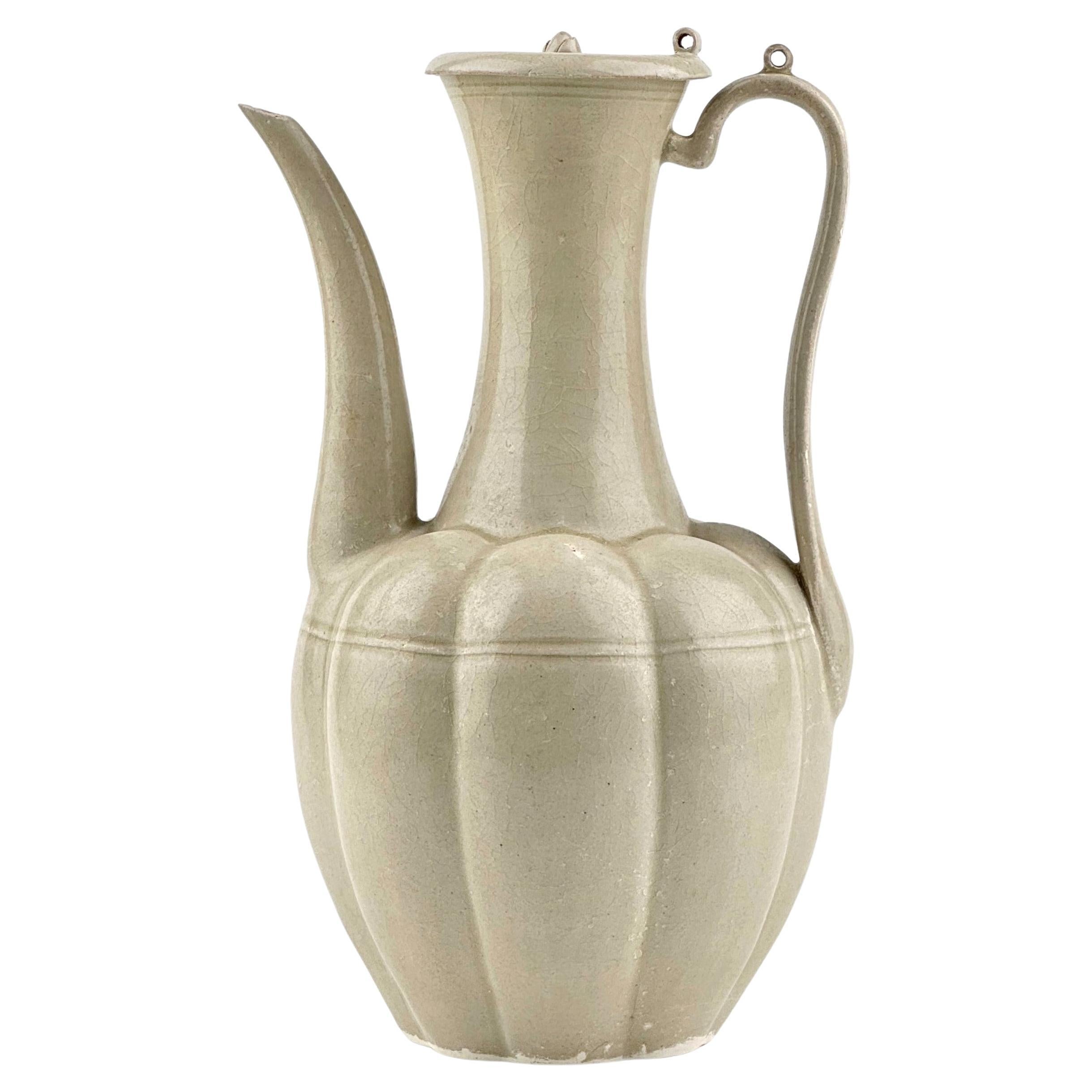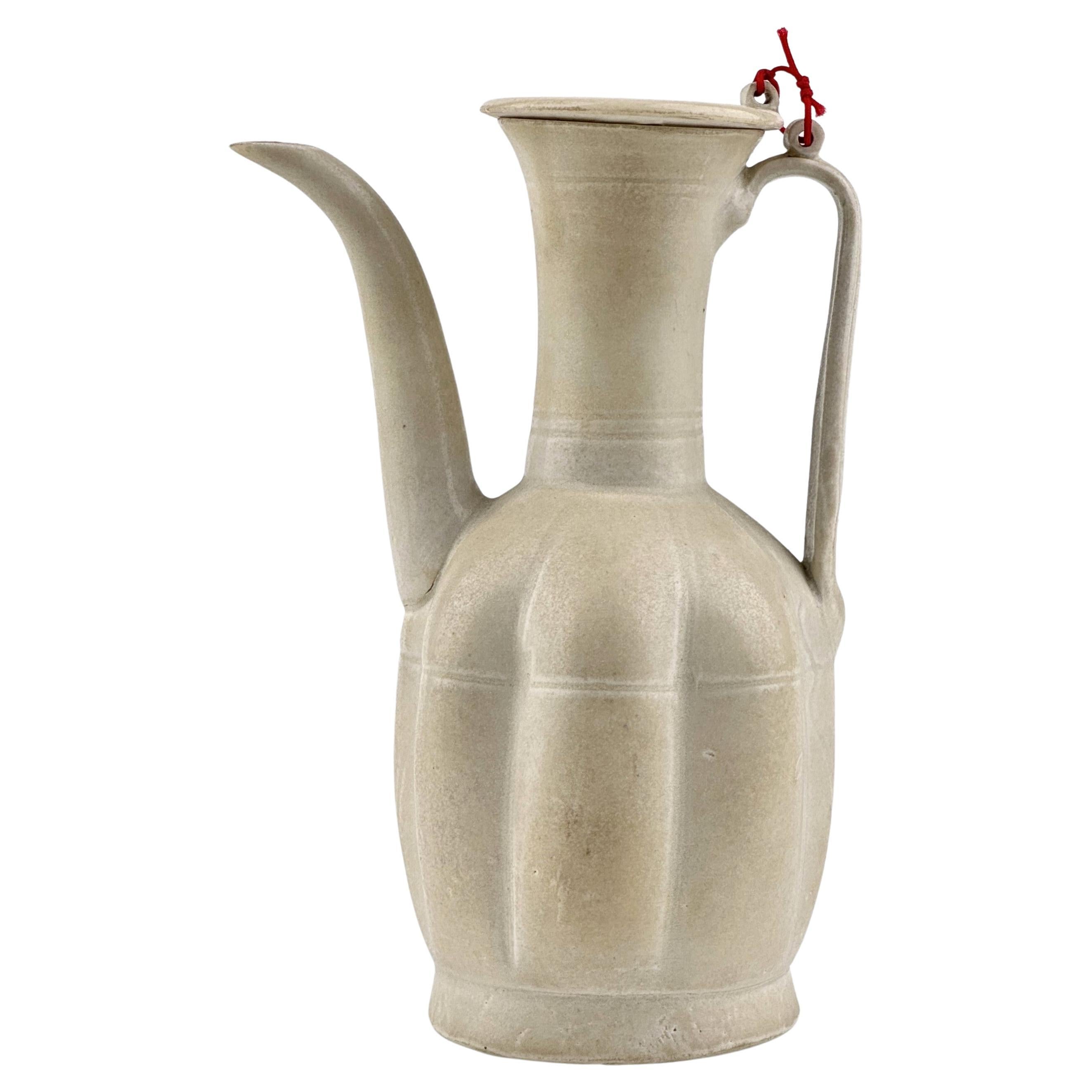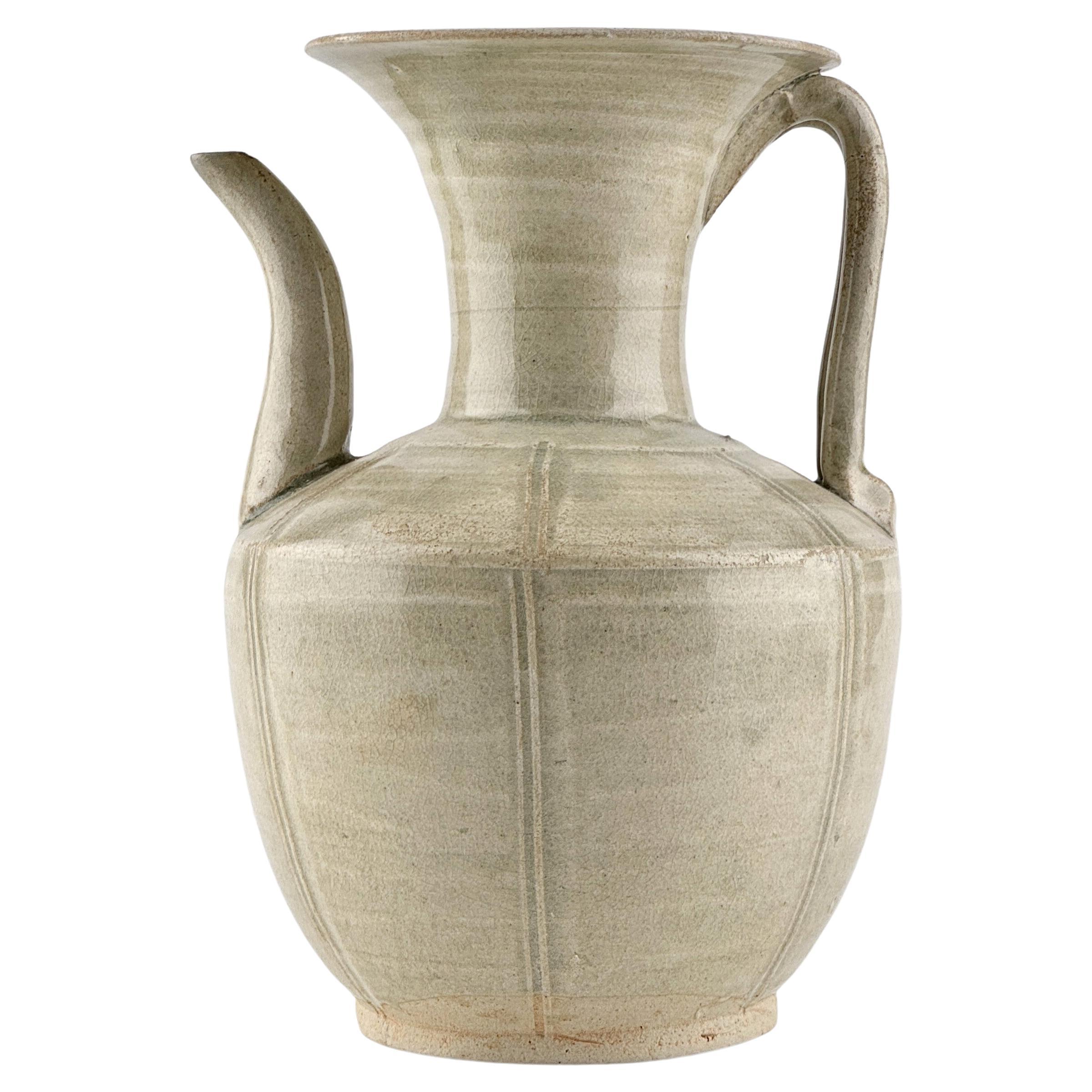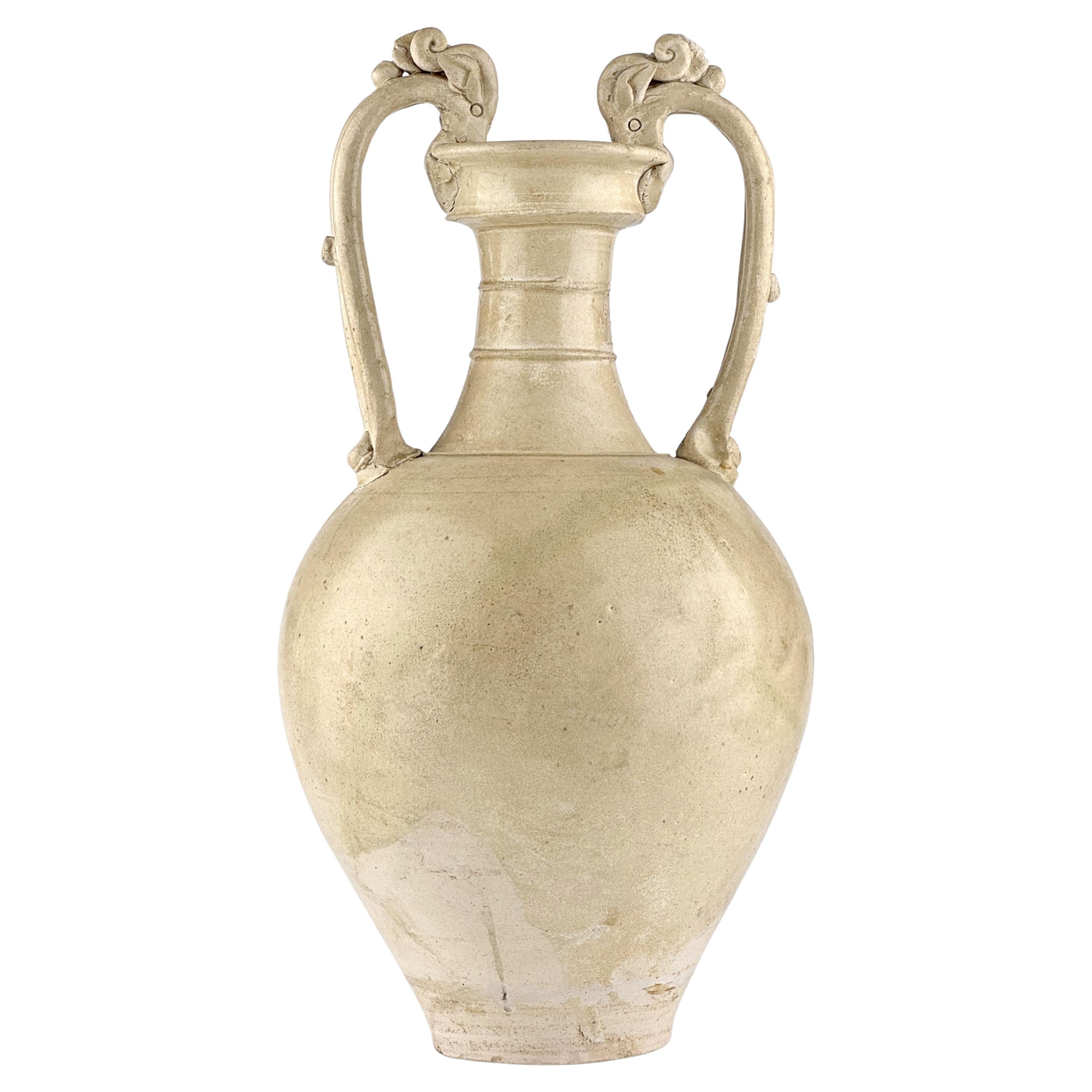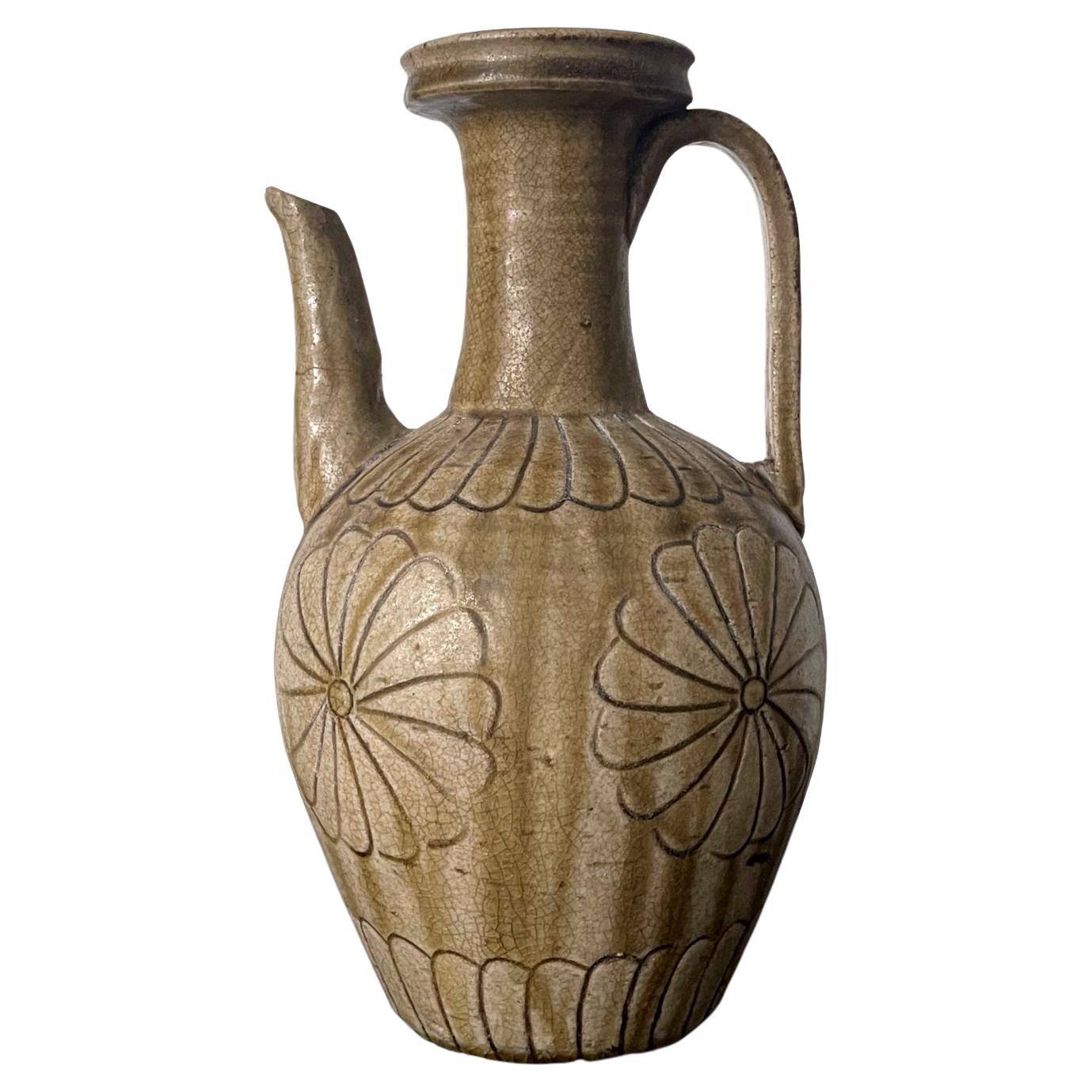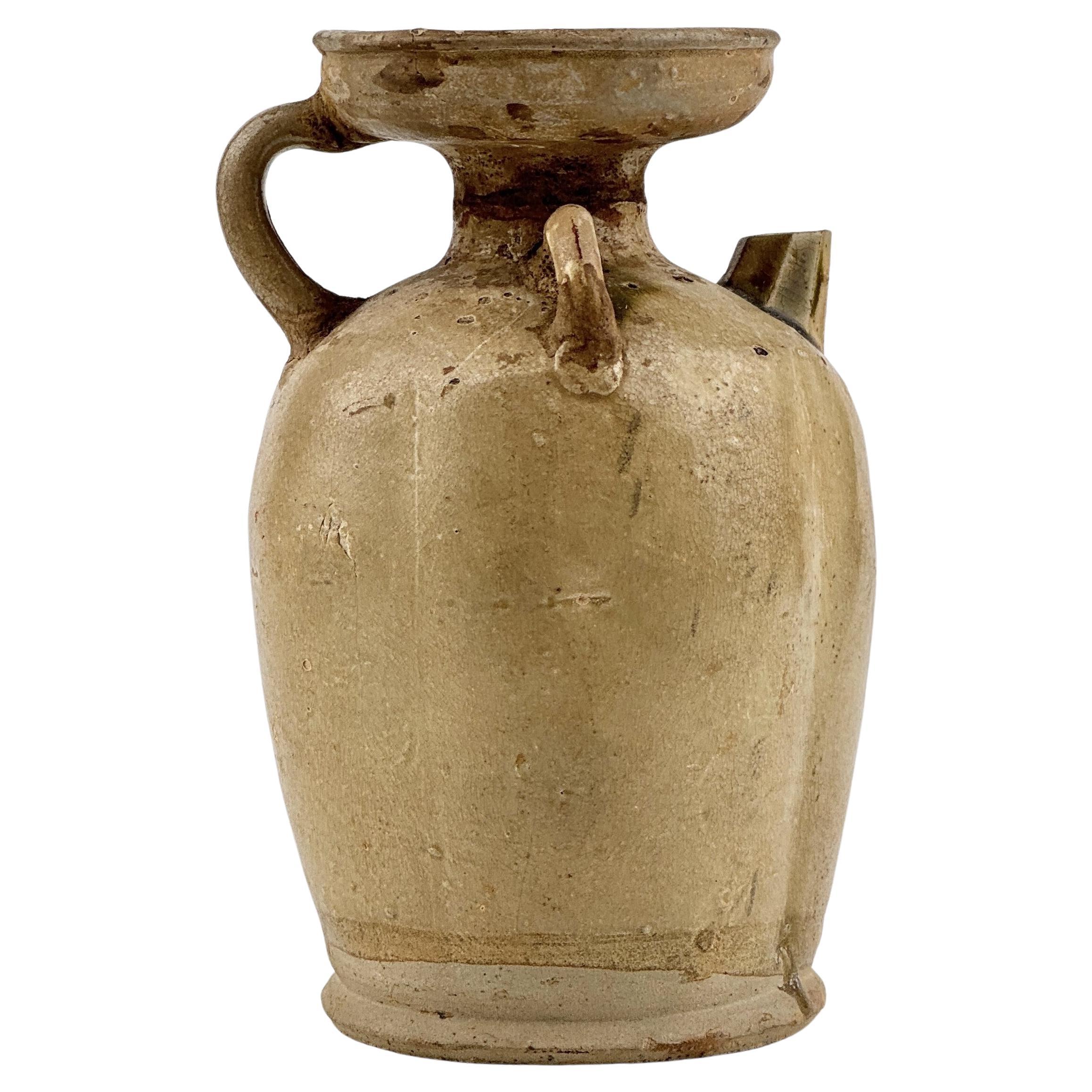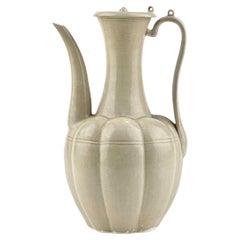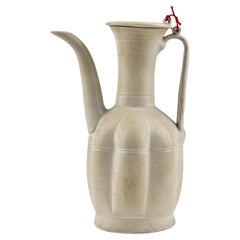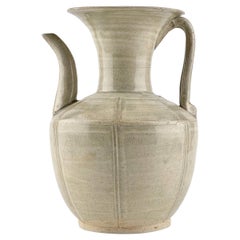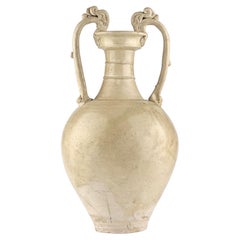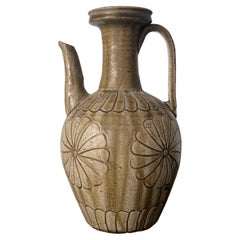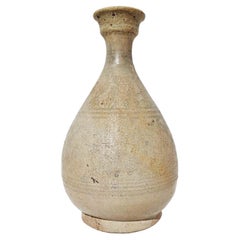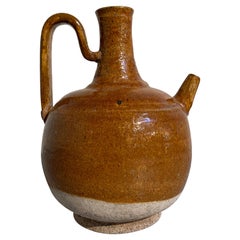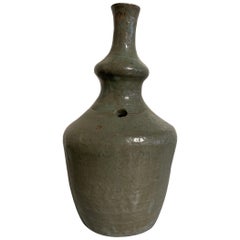Items Similar to Rare annamese cream glazed ewer, Vietnam, 11-15th century
Want more images or videos?
Request additional images or videos from the seller
1 of 11
Rare annamese cream glazed ewer, Vietnam, 11-15th century
$2,500
£1,915.95
€2,202.04
CA$3,511.37
A$3,929.87
CHF 2,057.15
MX$47,740.85
NOK 26,120.56
SEK 24,649.21
DKK 16,431.13
About the Item
Famous annamese cream glazed ceramic ewer covered with a cream glaze. Traces of excavation are clearly visible in the glaze.
Dates : Presumably Ly Dynasty (11-13th century)
Region : Vietnam
Type : Ewer
Found/Acquired : Southeast Asia , South China Sea, Shipwreck
* Vietnamese Pottery from the 10th to 15th Century
From the 10th to the 15th century, Vietnamese pottery underwent significant developments, reflecting various technological advancements and cultural influences. This period marked an important era in which Vietnamese pottery developed its unique styles and techniques, impacting not only Southeast Asia but also a broader region.
10th to 12th Century: Early Developments
- 10th Century: After gaining independence, Vietnam began to develop its own pottery styles, moving away from Chinese influences. This period primarily featured simple forms and functional designs.
- Ly Dynasty: From the 11th century, during the Ly Dynasty, Vietnamese pottery became more sophisticated and varied. Although Chinese pottery techniques and styles continued to influence it, Vietnam started to integrate more of its unique elements and techniques.
13th Century: Leap and Innovation
- During this time, Vietnamese pottery saw significant advancements, particularly towards the end of the Ly Dynasty, showcasing unique beauty and technical innovation.
- Medieval Vietnamese Pottery: The major production area was the Red River Delta region, particularly in the north, famous for its scenic depictions on ceramics. Pottery produced here began to be exported to foreign markets, including China and Japan.
14th and 15th Century: Maturity and Expansion
- Ho Dynasty and Later Le Dynasty: During these periods, Vietnamese pottery developed increasingly complex designs featuring a variety of colors and patterns. High-end products such as blue and white porcelain were produced.
- Trade and Cultural Exchange: By this time, Vietnamese pottery was being exported beyond Southeast and East Asia, reaching even Europe. This indicated international recognition of the quality and artistry of Vietnamese ceramics.
- Dimensions:Height: 7.88 in (20 cm)Diameter: 3.15 in (8 cm)
- Materials and Techniques:
- Place of Origin:
- Period:
- Date of Manufacture:11-15th century
- Condition:Repaired: Repair on spout. Wear consistent with age and use.
- Seller Location:seoul, KR
- Reference Number:1stDibs: LU9577239587732
About the Seller
4.8
Gold Seller
Premium sellers maintaining a 4.3+ rating and 24-hour response times
Established in 1999
1stDibs seller since 2023
38 sales on 1stDibs
Typical response time: <1 hour
- ShippingRetrieving quote...Shipping from: seoul, Korea South
- Return Policy
Authenticity Guarantee
In the unlikely event there’s an issue with an item’s authenticity, contact us within 1 year for a full refund. DetailsMoney-Back Guarantee
If your item is not as described, is damaged in transit, or does not arrive, contact us within 7 days for a full refund. Details24-Hour Cancellation
You have a 24-hour grace period in which to reconsider your purchase, with no questions asked.Vetted Professional Sellers
Our world-class sellers must adhere to strict standards for service and quality, maintaining the integrity of our listings.Price-Match Guarantee
If you find that a seller listed the same item for a lower price elsewhere, we’ll match it.Trusted Global Delivery
Our best-in-class carrier network provides specialized shipping options worldwide, including custom delivery.More From This Seller
View AllA Rare Cream-Glazed Ding yao Ewer and Cover, Northern Song Dynasty (960–1127)
Located in seoul, KR
The octagonal lobed ovoid body rising from a short spreading foot to a tall trumpet neck, set at the shoulder with a tall curved spout and to the other side with a tall strap handle, the dished cover surmounted with a ruyi-shaped finial, covered overall in a creamy-white glaze. Compared to other similar types of Northern Song Dynasty ceramics, this piece is extremely elegant in shape. It most closely resembles the Qingbai porcelain in the collection of The Museum of Oriental Ceramics in Osaka.
Period : Northern Song dynasty(960~1127)
Type : Creamy-white Ding yao glaze Ewer
Provenance : Acquired in 1999, Hongkong
Reference : THE MET Accession Number: 18.57.1
Sotheby's London 2018 - St George Street Sale Asian Art - Lot 208
* Song Dynasty Ding-Yao Ware
Song Dynasty Ding Yao porcelain holds a significant place in Chinese ceramic art, specifically as a type of white porcelain produced during the Song Dynasty. Produced predominantly during the mid to late Song Dynasty, Ding Yao ceramics are renowned for their delicate and intricate features.
Ding Yao ceramics were primarily crafted from clay rich in white minerals and fired at high temperatures to achieve a durable and lustrous surface. One distinctive characteristic of this serene white ceramic is the presence of silver or gold-colored splashes of glaze, often created using a mineral called galena. Galena, with its lustrous appearance, was suitable for creating fine patterns and intricate decorations.
These ceramics frequently feature delicate carvings, floral motifs, or subtle decorations. While commonly used for utilitarian purposes such as tableware, Ding Yao porcelain also served as a medium for artistic expression, producing many artworks. The production of Ding Yao ceramics was relatively limited, and surviving pieces are considered rare and valuable art pieces...
Category
Antique 15th Century and Earlier Hong Kong Antiquities
Materials
Ceramic
$17,970 Sale Price
70% Off
Rare Cream Glazed Ding yao Ewer and Cover, Song Dynasty (960~1279)
Located in seoul, KR
This is a Song Dynasty ceramic ewer, exhibiting the characteristic simplicity and elegance of the period. The ewer's form is sturdy with a full-bodied base that tapers gently to a na...
Category
Antique 15th Century and Earlier Hong Kong Chinese Export Antiquities
Materials
Ceramic
$9,950 Sale Price
50% Off
A Zhejiang Porcelain Ewer, Northern Song Dynasty
Located in seoul, KR
The oviform body is divided into few lobes. All covered in a finely crackled pale olive-green glaze. The surface and glaze characteristics are definitive, confirming the authenticity...
Category
Antique 15th Century and Earlier Hong Kong Antiquities
Materials
Porcelain
$2,925 Sale Price
35% Off
A Large and Rare Straw-Glazed Pottery Amphora, Tang Dynasty
Located in seoul, KR
The ovoid shape suggests the influence from “amphora” of Greece and Rome, while the dragon-shaped handles allude to Persian and Central Asian metalwork. The ubiquitous dragon is a Ea...
Category
Antique 15th Century and Earlier Hong Kong Tang Antiquities
Materials
Pottery, Stoneware
$8,125 Sale Price
35% Off
Changsha Ewer, Tang Dynasty
Located in seoul, KR
It features two small lug handles on either side of the neck and a spout opposite the main handle. This ewer might have been used for wine or other liquids, which were poured through...
Category
Antique 15th Century and Earlier Hong Kong Tang Antiquities
Materials
Pottery, Stoneware
$1,516 Sale Price
60% Off
Rare Yue Celadon Chicken-Head Ewer, Jin-Southern Dynasty
Located in seoul, KR
Chicken-head ewers are among the most distinct and emblematic pottery pieces from the Han (206 BC ~ AD 220) to the Tang dynasties. Their production commenced during the Jin dynasty i...
Category
Antique 15th Century and Earlier Hong Kong Han Antiquities
Materials
Pottery
$6,950 Sale Price
50% Off
You May Also Like
Japanese Ko-Seto Stoneware Ewer with Carved Design
Located in Atlanta, GA
On offer is a rare Ko-seto (old seto) stoneware ewer from Kamakura period (12-14th century) Japan. The exceptionally heavily potted ewer is made of stoneware. The main body was likely hand-coiled with individually built handle, sprout and wheel-made neck and mouth assembled. It takes the basic form from the contemporary Chinese ewer...
Category
Antique 15th Century and Earlier Japanese Archaistic Ceramics
Materials
Stoneware
Thai Ceramic Vase, Mid 19th Century
Located in New York, NY
A ceramic vase from Thailand, with light cream glaze and painted floral decorations. Late 19th Century.
While the golden age of Thai ceramics ended around the 15-16th Centuries, Thai craftsmen learned the art through generations, later producing smaller numbers of pieces with different clays and glazing techniques, inspired by the original master artisans of places like Si-Satchanalai and Sawankhalok.
This small vase is beautifully preserved, measuring approximately 5 inches in diameter and 9.5 inches high. Its light beige glaze and still visible painted decorations is reminiscent of the impeccable craft of the ancient Southeast Asian ceramics.
Category
Antique 1850s Thai Other Vases
Materials
Earthenware
$725 Sale Price
20% Off
Chinese Liao Dynasty Amber Glazed Stoneware Strap Handle Ewer, 11th Century
Located in Austin, TX
A lovely Chinese amber glazed pottery pouring vessel, Liao Dynasty (907 to 1125 AD).
The vessel featuring a globular body with an elongated neck sligh...
Category
Antique 15th Century and Earlier Chinese Tang Ceramics
Materials
Stoneware
Korean Celadon Glazed Ritual Ewer, Kundika, Goryeo Dynasty, 13th-14th Century
Located in Austin, TX
An understated and very heavily potted celadon glazed Korean ritual ewer or water sprinkler, kundinka, Goryeo Dynasty, 13th-14th century.
The unusu...
Category
Antique 15th Century and Earlier Korean Ceramics
Materials
Stoneware
Antique Chinese Yue Chicken Head Spout Ewer
Located in Point Richmond, CA
A globular stoneware body that is well potted with a cup shaped mouth supported on a narrow tall neck. The characteristic chicken head form serves as the spout. The handle is pulled ...
Category
Antique 15th Century and Earlier Chinese Other Ceramics
Materials
Ceramic
Provincial Chinese Glazed Water Jug, c. 1850
Located in Chicago, IL
This 19th-century kitchen vessel is coated inside and out with a dark brown glaze that clings to its ribbed sides with subtle color variation. Designed for serving water or tea, the squat jar features a narrow neck, small strap handles, and a short spout for pouring. The rounded shoulders are brushed with simple linework in a contrasting light brown glaze. Textured with pitted wear and other imperfections, the rustic vessel is wonderful as an unusual vase...
Category
Antique Mid-19th Century Chinese Qing Ceramics
Materials
Ceramic
More Ways To Browse
Antique Cream Furniture
Antique 15th Century Furniture
Rare Glazed
Vietnam Furniture
10th Century
13th Century Furniture
11th Century
12th Century Furniture
Antique White Stoneware
11th Century Furniture
Design Technics Pottery
14th Century Medieval
14th Century China
Chinese 14th Century
Antique Japanese Stoneware
Porcelain Ewer
Foreign Pottery
Shipwreck China
